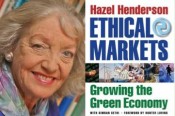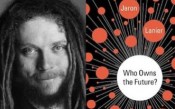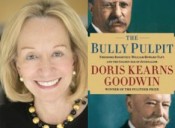Free Forum Q&A- HAZEL HENDERSON, Ethical Markets Can We Still Solve Big Problems?-Part2
Written on January 29th, 2014 |
Aired: 1/26/14
As we begin a new year, let’s look at where we are in the big picture. What are the most critical issues facing the US and the world? How do you see things moving in those areas? How are things getting worse or better? What should we be keeping our eyes on in the year to come?
My guest this week will be HAZEL HENDERSON, who’s been asking these sorts of questions for at least the last 40 years. We’re going to approach this exploration globally as well as nationally, with a long-term view, and with an eye toward relationships and systems that we often miss in our day-to-day focus on the latest news and events.
If this sounds familiar, it’s because this was my plan a few weeks ago when Hazel was my guest. But we ended up spending so much time on her journey – a remarkable journey it is, a mom in New York who’d never been to college got upset about pollution threatening her young child, became an activist, and developed into a global expert on economics and sustainability.
Free Forum Q&A: SARAH VanGELDER Editor-in-Chief, YES! Magazine 10 Hopeful Things That Happened in 2013
Written on January 7th, 2014 |
Aired 01/05/14
These days the media are full of lists – the best and worst of 2013 – movies, TV, music, books, etc. as well as lists of resolutions and tips for 2014. So when I got an email from SARAH VanGELDER, co-founder and editor-in-chief of YES! Magazine, in which she wrote. “I just posted my end-of-year column on the stories from 2013 that could make 2014 transformative,” , I invited her to join me today. She actually titled her article, “10 Hopeful Things That Happened in 2013 to Get You Inspired for What’s to Come,” and that sounds like a great conversation to start the new year.
We’ll look back and ahead with an eye toward catching the waves or the winds of change, building on the best of last year to make 2014 even better. Let’s commit to taking action to move us all a bit closer to a world that just might work.
Free Forum Q&A – RICHARD HEINBERG, Author of SNAKE OIL: Fracking’s Promise of Plenty Imperils Our Future
Written on December 3rd, 2013 |
Aired: 12/1/13
What do you know about hydraulic fracturing or “fracking” of natural gas?Probably depends on who you’re listening to. The fossil fuel industry tells you it’s the biggest energy development of the century, which promises America energy independence for the US and a huge boost to our economy with benefits to local economies. Many of the communities themselves tell a different story – of pollution on the one hand and social disruption on the other.
For the spoils of success, I recommend an article in March 2013 Harpers, Where Broken Hearts Stand, Grief and Recovery on the Badlands of North Dakota by Richard Manning.
RICHARD HEINBERG has a new book, SNAKE OIL: How Fracking’s Promise of Plenty Imperils Our Future, looks at fracking from both economic and environmental perspectives, informed by the most thorough analysis of shale gas and oil drilling data ever undertaken.
Join us as I try to find out, Is fracking the miracle cure-all to our energy ills, or a costly distraction from the necessary work of reducing our fossil fuel dependence?
Free Forum Q&A: JARON LANIER, Author of WHO OWNS THE FUTURE?
Written on November 26th, 2013 |
Aired: 11/24/13
After its recent IPO, Twitter is valued at nearly $25Billion. Now what is Twitter? Millions of tweets created and shared by users plus some ads. But how many users get a piece of that $25Billion? Well, none.
Where would Facebook be without Friends? What would Twitter, Amazon, Yelp, and any network whose value is based on our data, be without us – sharing photos and feelings, making purchases, registering opinions. More than programming or advertising, TV has always been about selling our eyeballs. Likewise, today’s online giants are selling our visits, our clicks, our shares.
JARON LANIER, in his new book, WHO OWNS THE FUTURE?, writes: “At the height of its power, Kodak employed more than 140,000 people and was worth $28 billion. They even invented the first digital camera. Today Kodak is bankrupt, and the new face of digital photography is Instagram. When Instagram was sold to Facebook for a billion dollars in 2012, it employed only 13 people. Where did all those jobs disappear? And what happened to the wealth that all those middle-class jobs created?”
He believes the emerging business model in which companies with relatively few employees profit off the participation of all of us, could doom any hope of a rebirth of the middle class. Lanier wants to solve a problem not many are talking about, and he envisions a radical solution — “a highly humanistic economy – one that will reward people for the valuable information they share with networks and the companies that control and profit from them.
Free Forum Q&A – DORIS KEARNS GOODWIN, Author of The Bully Pulpit Roosevelt vs Robber Barons
Written on November 19th, 2013 |
Aired: 11/17/13
The gap between rich and poor is huge and growing…legislative stalemate paralyzes the country…corporations fight federal regulations…the influence of money in politics is greater than ever…new inventions speed the pace of daily life.
Sound familiar? Those headlines from the early 1900s set the scene for Doris Kearns Goodwin’s new book The Bully Pulpit-a history of the first decade of the Progressive era – a time when courageous journalists and an ambitious president took on the Robber Barons – the 1% of their day – and won.
Goodwin tells the tale through the long friendship of Theodore Roosevelt and William Howard Taft – a relationship that serves both until it ruptures in 1912, when they engage in a brutal fight for the presidential nomination that cripples the progressive wing of the Republican Party and helps elect Woodrow Wilson.
Getting equal billing in her account is the golden age of journalism led by the muckraking press at McClure’s magazine. Together a bold and progressive press and a strong and progressive president served the people of the US rather than the super wealthy and the corporations. What lessons can we learn to help us turn this country around a century later?
